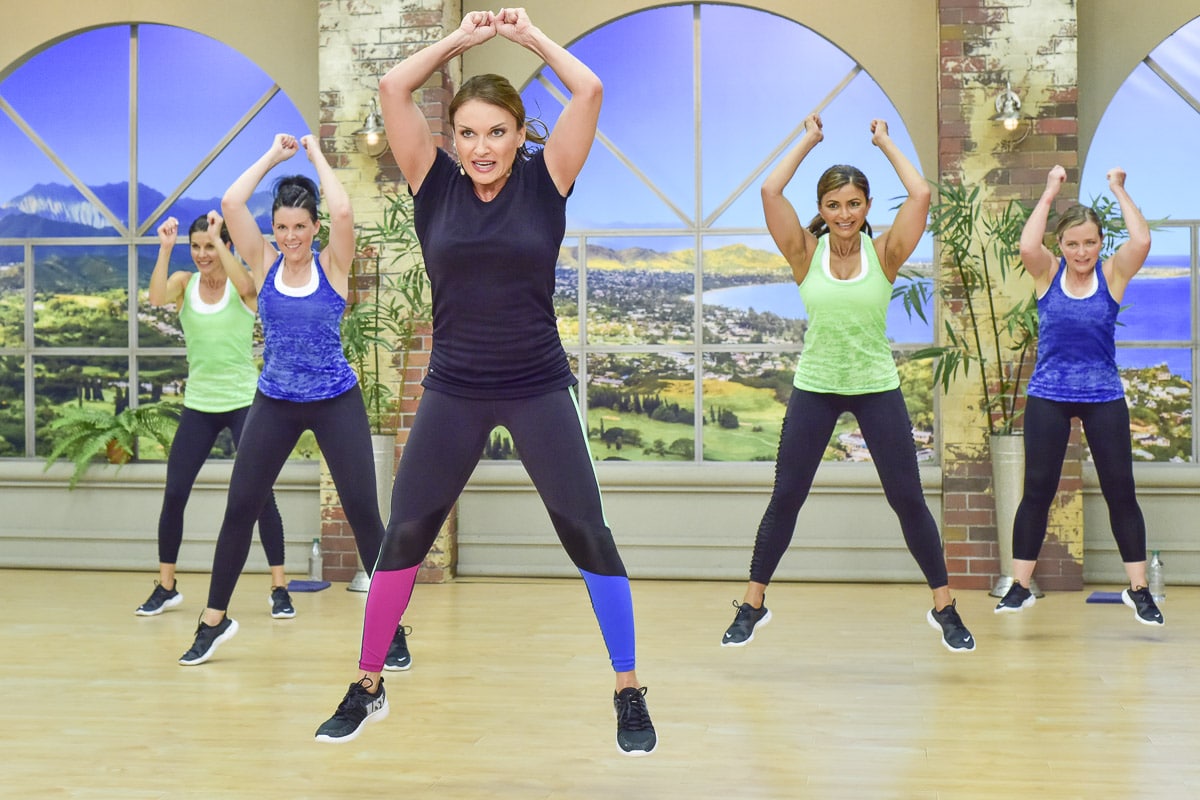Home>Misc>Featured>What Is The Meaning Of Cardiovascular Fitness


Featured
What Is The Meaning Of Cardiovascular Fitness
Modified: January 22, 2024
Discover the meaning of cardiovascular fitness with our featured article. Learn why it's essential for a healthy heart and overall well-being.
Introduction
Cardiovascular fitness is a phrase that is often thrown around when discussing exercise and physical well-being. But what exactly does it mean? At its core, cardiovascular fitness refers to the ability of the heart, lungs, and blood vessels to supply oxygenated blood to the working muscles during prolonged physical activity.
Cardiovascular fitness, also known as aerobic fitness, is a key component of overall fitness and plays a crucial role in maintaining good health. It affects several aspects of our lives, from how easily we can climb a flight of stairs to how efficiently our bodies can perform daily tasks.
Without adequate cardiovascular fitness, our bodies may struggle to meet the demands of physical activity, leading to fatigue, shortness of breath, and an overall decrease in stamina. On the other hand, having good cardiovascular fitness can lead to numerous benefits, both physically and mentally.
In this article, we will explore the meaning of cardiovascular fitness, its importance, the benefits it brings, and how we can improve and maintain it. Whether you are just starting your fitness journey or looking to enhance your overall well-being, understanding and prioritizing cardiovascular fitness can make a significant difference in your quality of life.
Definition of Cardiovascular Fitness
Cardiovascular fitness, also known as aerobic fitness, refers to the ability of the cardiovascular system to efficiently supply oxygenated blood to the working muscles during physical activity.
When we exercise, our muscles require a steady supply of oxygen to function optimally. The cardiovascular system, consisting of the heart, blood vessels, and lungs, works together to deliver oxygen-rich blood to the muscles and remove waste products, such as carbon dioxide.
A key indicator of cardiovascular fitness is the maximum amount of oxygen that a person’s body can utilize during intense exercise, known as VO2 max. It is a measure of how efficiently the cardiovascular system can deliver oxygen to the muscles.
Cardiovascular fitness can be enhanced through activities that increase the heart rate and respiratory rate, such as running, cycling, swimming, and brisk walking. Engaging in regular aerobic exercise trains the cardiovascular system to become more efficient at delivering oxygen, which leads to improved cardiovascular fitness.
It is important to note that cardiovascular fitness is different from muscular strength or flexibility, although these components are interconnected and contribute to overall physical fitness. While cardiovascular fitness focuses on the body’s ability to sustain endurance activities over a prolonged period, muscular strength relates to the force that muscles can exert, and flexibility refers to the range of motion of joints.
By prioritizing cardiovascular fitness in your exercise regimen, you can improve your body’s ability to perform physical activities with less fatigue, reduce the risk of various chronic diseases, and enhance overall well-being.
Importance of Cardiovascular Fitness
Cardiovascular fitness plays a vital role in maintaining good health and overall well-being. Here are some key reasons why cardiovascular fitness is important:
- Improved Heart Health: Regular aerobic exercise strengthens the heart muscle, making it more efficient at pumping blood. This helps to lower resting heart rate and blood pressure, reducing the risk of cardiovascular diseases such as heart attack and stroke.
- Increased Endurance: Engaging in cardiovascular activities improves the body’s ability to sustain prolonged physical activity. This can lead to increased stamina, allowing you to perform daily tasks with less fatigue and have more energy throughout the day.
- Weight Management: Cardiovascular exercise is an effective way to burn calories and support weight loss or maintenance goals. By incorporating regular aerobic activity into your routine, you can help control body weight and reduce the risk of obesity-related health issues.
- Mood Enhancement: Physical activity releases endorphins, also known as “feel-good” hormones, which can boost mood and reduce symptoms of stress, anxiety, and depression. Regular cardiovascular exercise has been linked to improved mental well-being and a better overall quality of life.
- Improved Respiratory Function: Regular aerobic exercise helps to strengthen the respiratory muscles and increase lung capacity, enhancing the efficiency of oxygen exchange in the lungs. This can result in easier breathing, especially during physical exertion.
- Reduced Risk of Chronic Diseases: Maintaining good cardiovascular fitness can lower the risk of various chronic conditions, including type 2 diabetes, certain types of cancer, and metabolic syndrome. It can also help manage existing conditions and improve overall health outcomes.
By prioritizing cardiovascular fitness in your exercise routine, you can experience these numerous benefits and improve your overall health and well-being. Incorporating regular aerobic exercise into your lifestyle is an investment in your long-term health.
Benefits of Cardiovascular Fitness
Engaging in regular cardiovascular exercise offers a wide range of benefits for both the body and mind. Here are some of the key advantages of improving your cardiovascular fitness:
- Improved Overall Health: Cardiovascular fitness has a positive impact on various aspects of health. It can strengthen the heart, lower blood pressure, improve cholesterol levels, and promote better blood circulation, reducing the risk of cardiovascular diseases.
- Increased Energy Levels: Regular aerobic exercise boosts the delivery of oxygen and nutrients to the muscles, improving their efficiency and enhancing your overall energy levels. As a result, you may find yourself feeling more awake, alert, and productive throughout the day.
- Enhanced Weight Management: Cardiovascular exercise is an effective way to burn calories and promote weight loss. It can also help maintain a healthy weight by increasing metabolism and reducing body fat. Regular exercise, combined with a balanced diet, can contribute to achieving and sustaining a healthy body weight.
- Better Stress Management: Cardiovascular activities stimulate the release of endorphins, which are natural mood boosters. These hormones can help alleviate stress, reduce anxiety, and improve overall mental well-being. Incorporating regular cardio exercise into your routine can be an effective stress management tool.
- Stronger Immune System: Regular exercise, including cardiovascular workouts, can enhance the immune system. It can strengthen the body’s defense mechanisms, making you less susceptible to common illnesses and infections.
- Improved Cognitive Function: Cardiovascular fitness has been linked to improved brain function, cognitive abilities, and memory. Regular exercise can enhance blood flow to the brain, promoting the growth of new blood vessels and brain cells, thereby enhancing overall cognitive performance.
- Enhanced Sleep Quality: Regular cardiovascular exercise can improve sleep quality and help combat insomnia. It can promote a deeper and more restful sleep, allowing your body to rejuvenate and recover effectively.
By making cardiovascular fitness a priority in your life, you can experience these numerous benefits, leading to improved overall health and well-being. Remember, consistency is key when it comes to reaping the rewards of regular aerobic exercise.
How to Improve Cardiovascular Fitness
Improving cardiovascular fitness requires a consistent commitment to regular aerobic exercise. Here are some effective strategies to boost your cardiovascular fitness:
- Choose aerobic activities: Engage in activities that elevate your heart rate and keep it elevated for a sustained period. Options include running, jogging, cycling, swimming, dancing, and brisk walking.
- Start gradually: If you’re new to exercise or have been inactive for a while, start with low-impact activities and gradually increase the intensity and duration. This will allow your body to adapt and minimize the risk of injury.
- Follow a routine: Aim for at least 150 minutes of moderate-intensity aerobic exercise or 75 minutes of vigorous-intensity aerobic exercise per week. You can break it down into shorter sessions throughout the week, ensuring consistency and variety in your workouts.
- Mix up your workouts: Incorporate a variety of cardiovascular exercises to target different muscle groups and keep your workouts interesting. This could include alternating between running, cycling, and swimming or trying out fitness classes like Zumba or kickboxing.
- Implement interval training: Interval training involves alternating between periods of high-intensity exercise and periods of lower-intensity recovery. This approach can boost cardiovascular fitness more effectively than steady-state cardio. For example, try alternating between jogging and sprinting during your runs.
- Incorporate strength training: Don’t neglect strength training exercises, as they contribute to overall fitness. Building muscle can enhance metabolism and support cardiovascular fitness. Include exercises like squats, lunges, push-ups, and weightlifting in your routine.
- Stay consistent: Consistency is key when it comes to improving cardiovascular fitness. Aim for regular, weekly workouts to maintain progress and continue challenging your cardiovascular system.
- Listen to your body: Pay attention to how your body feels during exercise. Gradually increase intensity and duration while allowing for rest and recovery as needed. If you experience any pain or discomfort, consult a healthcare professional.
- Stay hydrated: Proper hydration is essential for optimal cardiovascular and overall health. Drink plenty of water before, during, and after your workouts to prevent dehydration and support your body’s performance.
- Seek professional guidance: If you’re unsure where to start or want personalized guidance, consider consulting with a fitness professional or personal trainer. They can help design a workout plan tailored to your fitness level and goals.
By following these strategies and maintaining consistency, you can gradually improve your cardiovascular fitness and reap the numerous health benefits associated with it.
Factors Affecting Cardiovascular Fitness
Several factors can influence an individual’s cardiovascular fitness level. Understanding these factors can help you assess your current fitness level and make necessary adjustments to improve it. Here are some key factors that play a role in cardiovascular fitness:
- Age: As we age, our cardiovascular fitness naturally tends to decline. However, regular exercise can help minimize this decline and maintain a good level of fitness throughout life.
- Genetics: Genetic factors can influence an individual’s baseline cardiovascular fitness level. Some people may be naturally predisposed to have a higher fitness capacity, while others may need to work harder to achieve the same level of fitness.
- Physical Activity Level: The amount and intensity of physical activity directly impact cardiovascular fitness. Engaging in regular aerobic exercise is essential to improve and maintain cardiovascular fitness. Sedentary individuals are more likely to have lower fitness levels.
- Body Composition: Body composition, specifically the ratio of lean muscle mass to body fat, can affect cardiovascular fitness. Having a higher percentage of lean muscle can improve metabolic function and overall fitness.
- Health Conditions: Certain health conditions can affect cardiovascular fitness. Conditions like obesity, high blood pressure, diabetes, and heart disease can limit the body’s ability to perform physical activity and impact cardiovascular health.
- Diet and Nutrition: Proper nutrition plays a crucial role in cardiovascular fitness. A well-balanced diet provides the necessary nutrients and energy to support exercise and overall physical health.
- Stress Levels: Chronic stress can have a negative impact on cardiovascular fitness. High-stress levels can lead to elevated blood pressure, increased heart rate, and other physiological responses that can hinder cardiovascular health.
- Environmental Factors: Environmental conditions, such as altitude, temperature, humidity, and air pollution, can affect cardiovascular fitness during exercise. These factors can impact the body’s capacity to efficiently transport oxygen and perform physical activity.
- Medication and Substance Use: Certain medications and substances, such as beta-blockers or smoking, can affect cardiovascular fitness. It is important to consult with a healthcare professional regarding any medication or substance use and its potential impact on fitness.
- Sleep Quality: Adequate sleep is crucial for overall health, including cardiovascular fitness. Poor sleep quality or insufficient sleep can negatively affect cardiovascular health and fitness levels.
While some factors may be beyond our control, many can be influenced or improved through lifestyle choices. By understanding these factors and taking steps to address them, you can optimize your cardiovascular fitness and improve your overall health and well-being.
Assessing Cardiovascular Fitness
Assessing your cardiovascular fitness level is essential to track progress, set goals, and tailor your exercise routine. While professional assessments can provide accurate and detailed results, there are several simple methods you can use to get a general idea of your cardiovascular fitness. Here are some common ways to assess cardiovascular fitness:
- Heart Rate Monitoring: Monitoring your heart rate during exercise can give you an indication of your cardiovascular fitness. This can be done using a heart rate monitor or manually by checking your pulse. The faster your heart rate returns to normal after exercise, the better your cardiovascular fitness.
- Measuring Resting Heart Rate: Resting heart rate is the number of times your heart beats per minute when you are at rest. A lower resting heart rate typically indicates better cardiovascular fitness. You can measure your resting heart rate by counting the beats over a minute first thing in the morning before getting out of bed.
- Performing the Talk Test: The talk test gauges your ability to carry on a conversation during physical activity. If you can comfortably speak while exercising, maintaining a conversation without gasping for breath, your cardiovascular fitness is likely in a good range. If you struggle to speak, it may indicate a lower level of fitness.
- Using Fitness Apps and Trackers: Fitness apps and trackers have built-in features that estimate and track cardiovascular fitness levels. They use data such as heart rate, duration of exercise, and intensity to provide an estimate of your fitness level. These metrics can be helpful for setting goals and monitoring progress over time.
- Conducting Field Tests: Field tests, such as the 1-mile walk test or the 3-minute step test, can provide a rough estimate of cardiovascular fitness. These tests measure how quickly your heart rate recovers after completing a specific exercise task.
- Seeking Professional Assessments: Professional assessments, such as a graded exercise test (commonly known as a stress test) or a VO2 max test, provide more accurate and detailed information about cardiovascular fitness. These tests are typically performed under controlled conditions with the guidance of a healthcare or fitness professional.
Remember that assessing cardiovascular fitness is not a one-time event, but rather an ongoing process. Regularly monitoring your fitness level can help you track progress and adjust your exercise routine to continually challenge your cardiovascular system.
Tips for Maintaining Cardiovascular Fitness
Once you’ve achieved a certain level of cardiovascular fitness, it’s important to maintain it to continue reaping the benefits. Here are some tips to help you maintain your cardiovascular fitness:
- Stay Consistent: Regular exercise is key to maintaining cardiovascular fitness. Aim for at least 150 minutes of moderate-intensity aerobic exercise or 75 minutes of vigorous-intensity aerobic exercise per week, spread across multiple days.
- Vary Your Workouts: Keep your exercise routine interesting by incorporating a variety of cardiovascular activities. Try different forms of aerobic exercise, such as swimming, biking, or dancing, to challenge your body and prevent boredom.
- Set Realistic Goals: Establish realistic goals for your fitness journey and work towards achieving them gradually. Setting achievable milestones will keep you motivated and focused on maintaining your cardiovascular fitness.
- Monitor Intensity: Pay attention to the intensity level of your workouts. Regularly challenge yourself by increasing the intensity or duration of your exercises to prevent plateaus and continue improving your cardiovascular fitness.
- Include Strength Training: Don’t neglect strength training exercises, as they complement cardiovascular fitness. Incorporating strength training can help maintain muscle mass, support metabolic health, and promote overall functional fitness.
- Prioritize Recovery: Allow your body sufficient time to rest and recover between workouts. This helps prevent overtraining and reduces the risk of injury. Adequate sleep, proper nutrition, and active recovery techniques, such as stretching and foam rolling, are essential for recovery.
- Stay Hydrated: Proper hydration is crucial for maintaining cardiovascular fitness. Drink an adequate amount of water before, during, and after your workouts to support optimal exercise performance and cardiovascular health.
- List to Your Body: Pay attention to your body’s signals and adjust your workouts accordingly. If you feel excessively fatigued, experience pain, or have any concerns, consult with a healthcare professional.
- Make it a Lifestyle: Embrace physical activity as a part of your lifestyle. Find activities you enjoy and make them a regular part of your routine. It’s easier to maintain cardiovascular fitness when it becomes a habit rather than a chore.
- Stay Motivated: Find ways to stay motivated and accountable. Set new challenges, track your progress, join a workout group or class, or find a workout partner to help keep you engaged and motivated on your fitness journey.
By following these tips, you can maintain your cardiovascular fitness and continue to enjoy the many benefits it brings. Remember, consistency and adherence to a healthy lifestyle are key to preserving your cardiovascular health long-term.
Conclusion
Cardiovascular fitness is a crucial component of overall health and well-being. It refers to the ability of the cardiovascular system to efficiently supply oxygenated blood to the working muscles during physical activity. Maintaining good cardiovascular fitness offers numerous benefits, including improved heart health, increased endurance, weight management, mood enhancement, and reduced risk of chronic diseases.
To improve cardiovascular fitness, it is important to engage in regular aerobic exercise, choose activities that elevate your heart rate, and gradually increase intensity and duration. Factors such as age, genetics, physical activity level, and diet can influence cardiovascular fitness, but many of these factors can be improved through lifestyle choices.
Assessing cardiovascular fitness can be done through various methods, including monitoring heart rate, measuring resting heart rate, performing field tests, and seeking professional assessments. Regularly monitoring your fitness level helps you track progress and make necessary adjustments to your exercise routine.
Maintaining cardiovascular fitness requires consistency, variety in workouts, realistic goal-setting, monitoring intensity, and prioritizing recovery. Strength training, hydration, paying attention to your body’s signals, and making physical activity a part of your lifestyle are also essential for maintaining cardiovascular fitness.
By prioritizing cardiovascular fitness and incorporating it into your daily life, you can enjoy the many benefits it brings, including improved overall health, increased energy levels, enhanced weight management, reduced stress, and better sleep quality. So, lace up your sneakers, choose your favorite aerobic activity, and start working towards improving and maintaining your cardiovascular fitness for a healthier, happier you!









